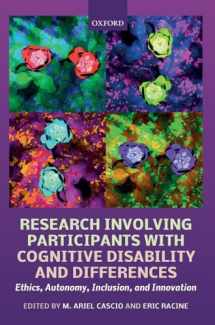
Research Involving Participants with Cognitive Disability and Differences: Ethics, Autonomy, Inclusion, and Innovation
Book details
Summary
Description
Research participants who have cognitive disabilities and differences may be considered a vulnerable population. At the same time, they should also be empowered to participate in research in order to foster the growth of knowledge and the improvement of practices. For research participants with cognitive disabilities or differences, participating in research that concerns them follows the Disability Rights Movement's call "Nothing About Us Without Us" and is a vital component of the principle of justice. However, cognitive disabilities and differences may pose challenges to ethical research, particularly with respect to the research ethics principle of autonomy, for a variety of reasons. Several alternative or modified strategies, for example when obtaining informed consent, have been used by researchers.
This volume provides timely, multidisciplinary insights into the ethical aspects of research that includes participants with cognitive disability and differences. These include conditions such as intellectual disability, autism, mild cognitive impairment (MCI), and psychiatric diagnoses. The chapters in this volume describe situations where difficulties arise, explore strategies for empowerment and inclusion, drawing on both empirical and normative research to offer suggestions for research design, research ethics, and best practices that empower people with cognitive disabilities and differences to participate in research while respecting and managing potential coercion or undue influence.
The book includes contributions from scholars in anthropology, sociology, ethics, child studies, health and rehabilitation sciences, philosophy, and law who address these issues in both clinical and social/behavioural research. The book will be valuable for anyone performing research involving these populations - from the fields of neuropsychology, neurology, psychiatry, and neuroscience.


We would LOVE it if you could help us and other readers by reviewing the book
Book review



